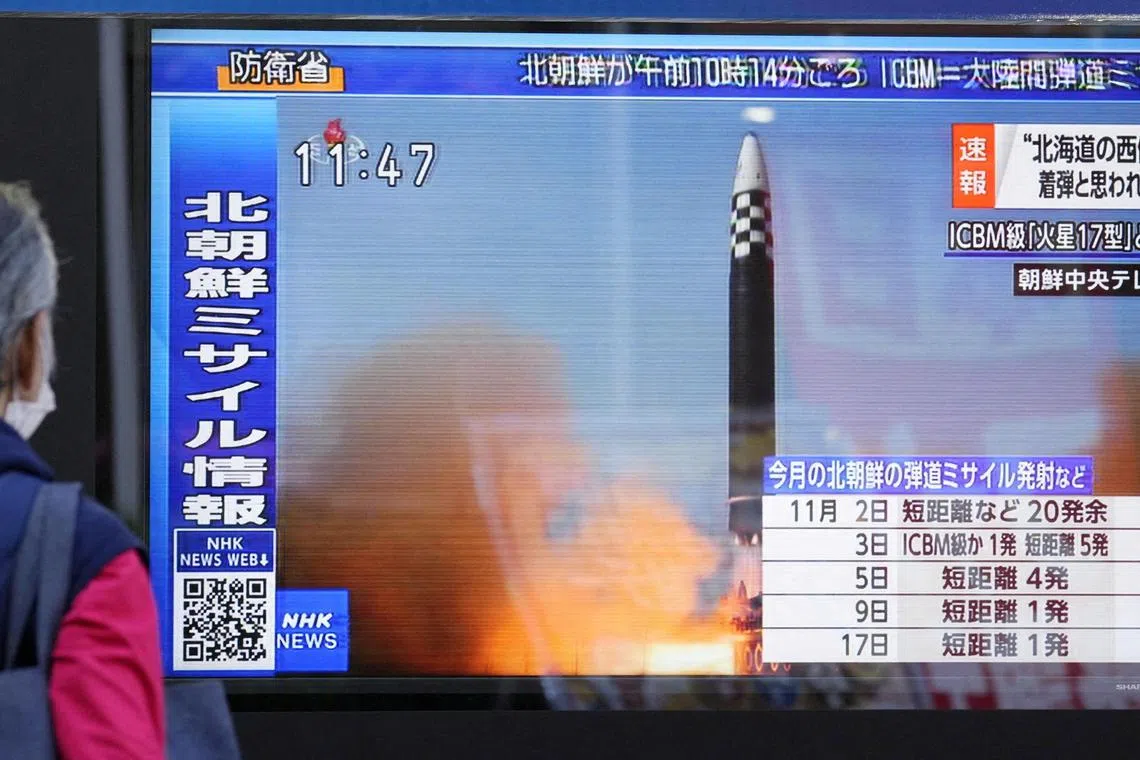North Korea fires two ballistic missiles, escalating tensions, says South Korea
Sign up now: Get insights on Asia's fast-moving developments

Pyongyang has conducted an unprecedented wave of weapons tests this year.
PHOTO: REUTERS
Follow topic:
SEOUL/TOKYO - North Korea fired two ballistic missiles towards the sea off the Korean peninsula’s east coast on Sunday, said South Korea and Japan, prompting South Korea’s presidential office to “strongly condemn” Pyongyang for escalating tensions.
South Korea’s Joint Chiefs of Staff (JCS) said the two medium-range missiles flew about 500km.
Japan’s Vice-Defence Minister Toshiro Ino said the missiles seemed to have landed outside Japan’s exclusive economic zone (EEZ) and there had been no report of damage.
“North Korea’s ballistic missiles were launched at steep angles and landed in the East Sea,” South Korea’s JCS said. The East Sea is also known as the Sea of Japan.
“South Korean and United States intelligence authorities are conducting a thorough analysis, factoring recent trends related to North Korea’s missile development.”
South Korea convened a National Security Council (NSC) meeting over North Korea’s missile launch and “strongly condemned” it for escalating tensions on the Korean peninsula, South Korea’s presidential office said in a statement.
The presidential office added that the North’s continued provocations and development of nuclear weapons and missiles would further endanger the North Korean regime.
This year, North Korean leader Kim Jong Un’s regime has already fired off more than 65 ballistic missiles
He has stepped up provocations in recent months in a display of anger at joint military drills in the region by the US and its allies South Korea and Japan.
Sunday’s launch came days after North Korea tested a “high-thrust solid-fuel motor”,
Despite heavy international sanctions over its weapons programmes, Pyongyang has built up an arsenal of intercontinental ballistic missiles (ICBMs).
All its known ICBMs are liquid-fuelled, however, and Mr Kim has placed strategic priority on developing solid-fuel engines for more advanced missiles.
Mr Kim said this year that he wants North Korea to have the world’s most powerful nuclear force, and declared his country an “irreversible” nuclear state.
The wishlist he revealed in 2021 included solid-fuel ICBMs that could be launched from land or submarines.
The latest motor test was a step towards that goal, but it is not clear how far North Korea has come in the development of such a missile, analysts said.
The US, Japan and South Korea have warned that Pyongyang could soon raise tensions even higher with a nuclear test, which would be its first in five years and seventh overall.
Washington, Tokyo and Seoul have all promised a harsh and coordinated punishment it Pyongyang goes ahead with a nuclear test, which would also be a violation of UN Security Council resolutions. AFP, BLOOMBERG, REUTERS

